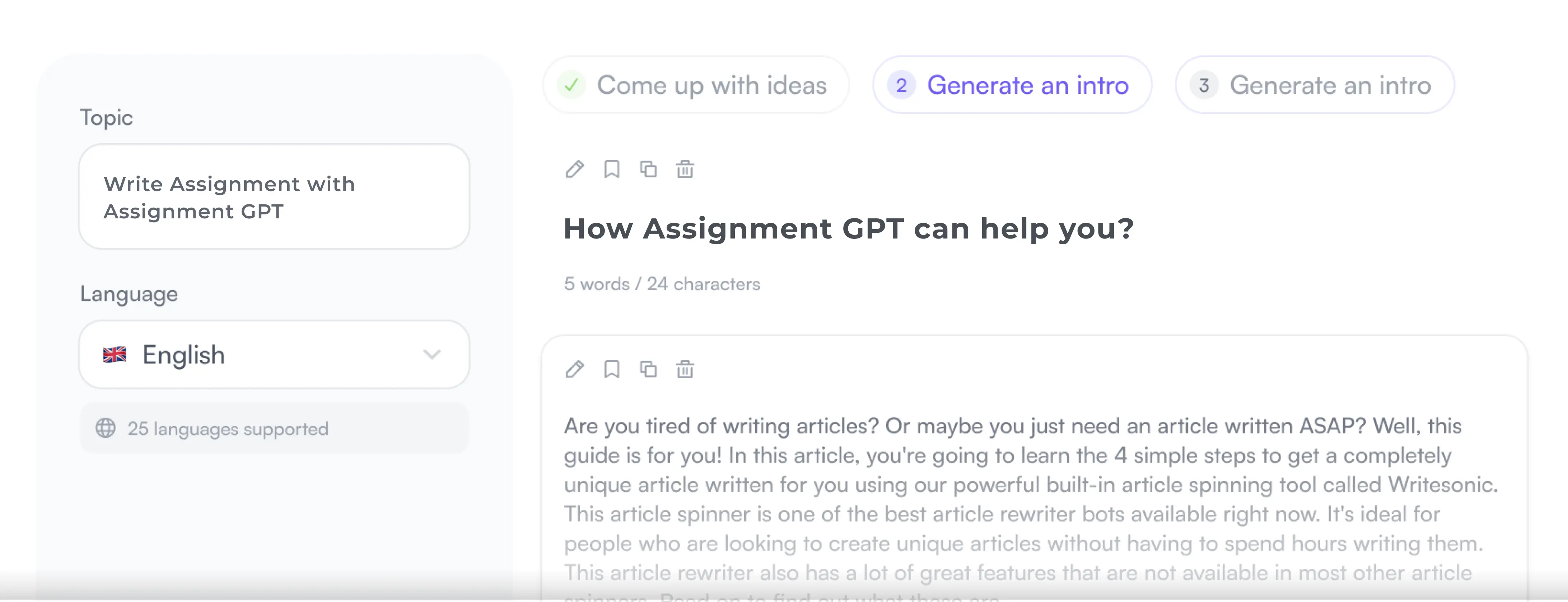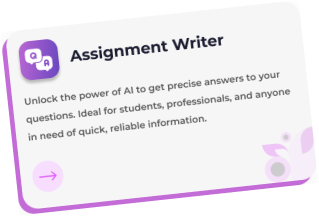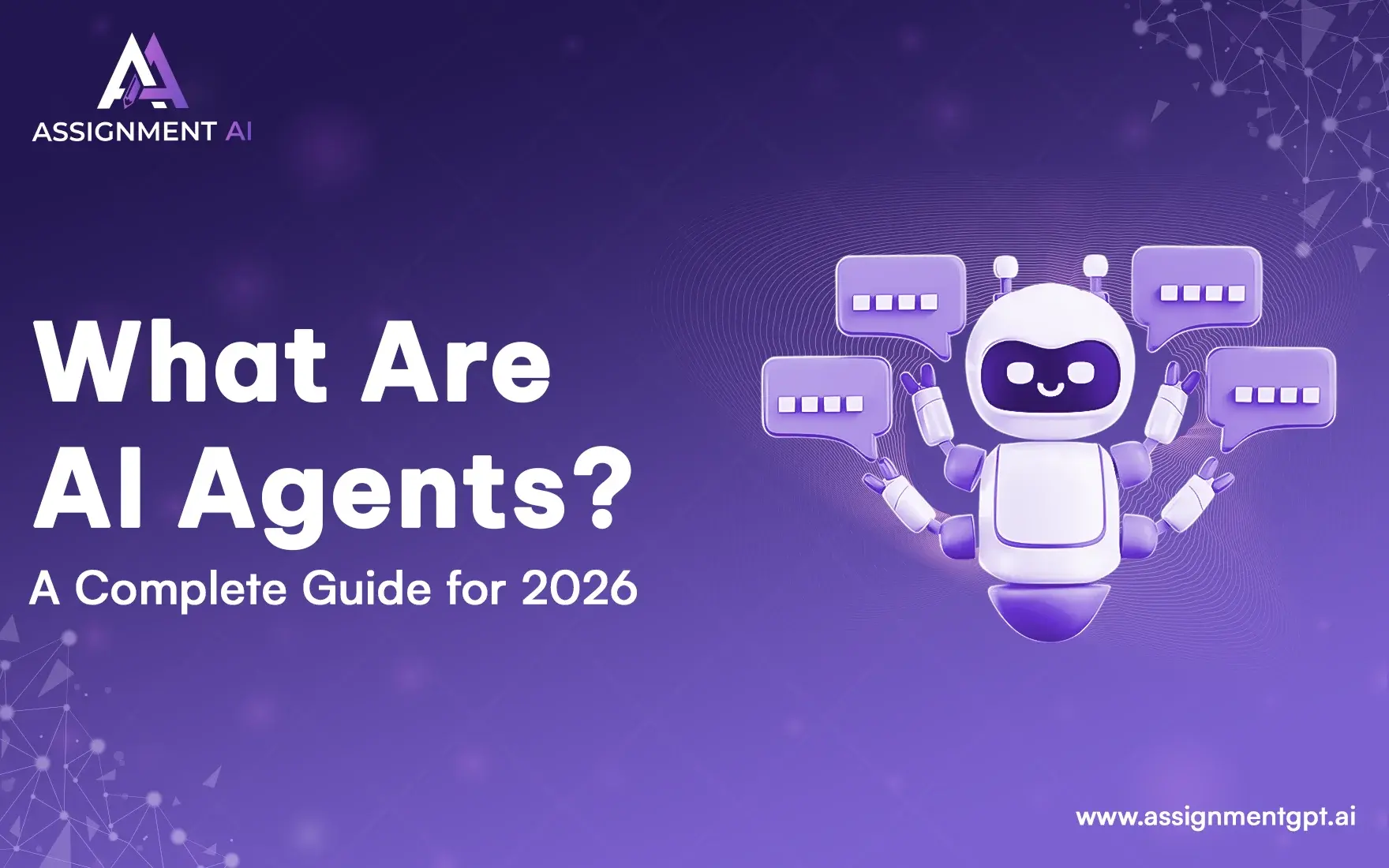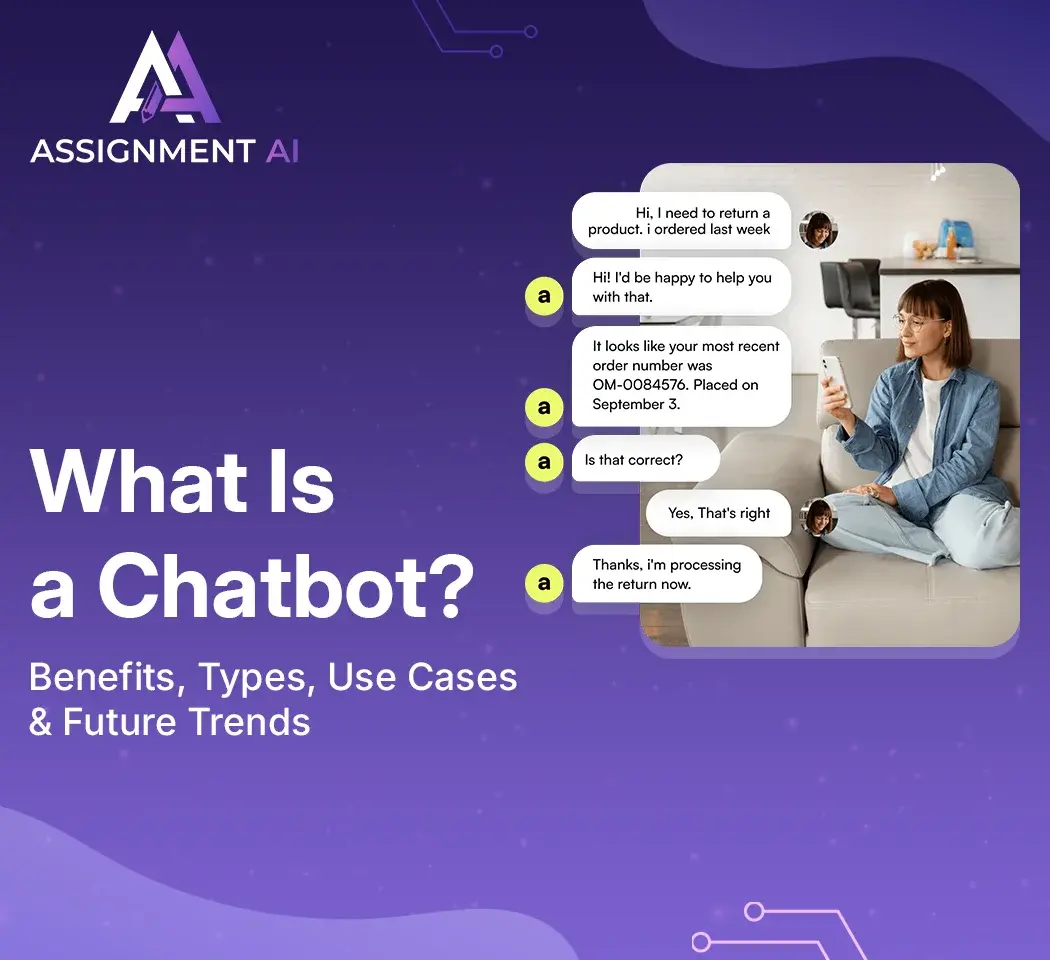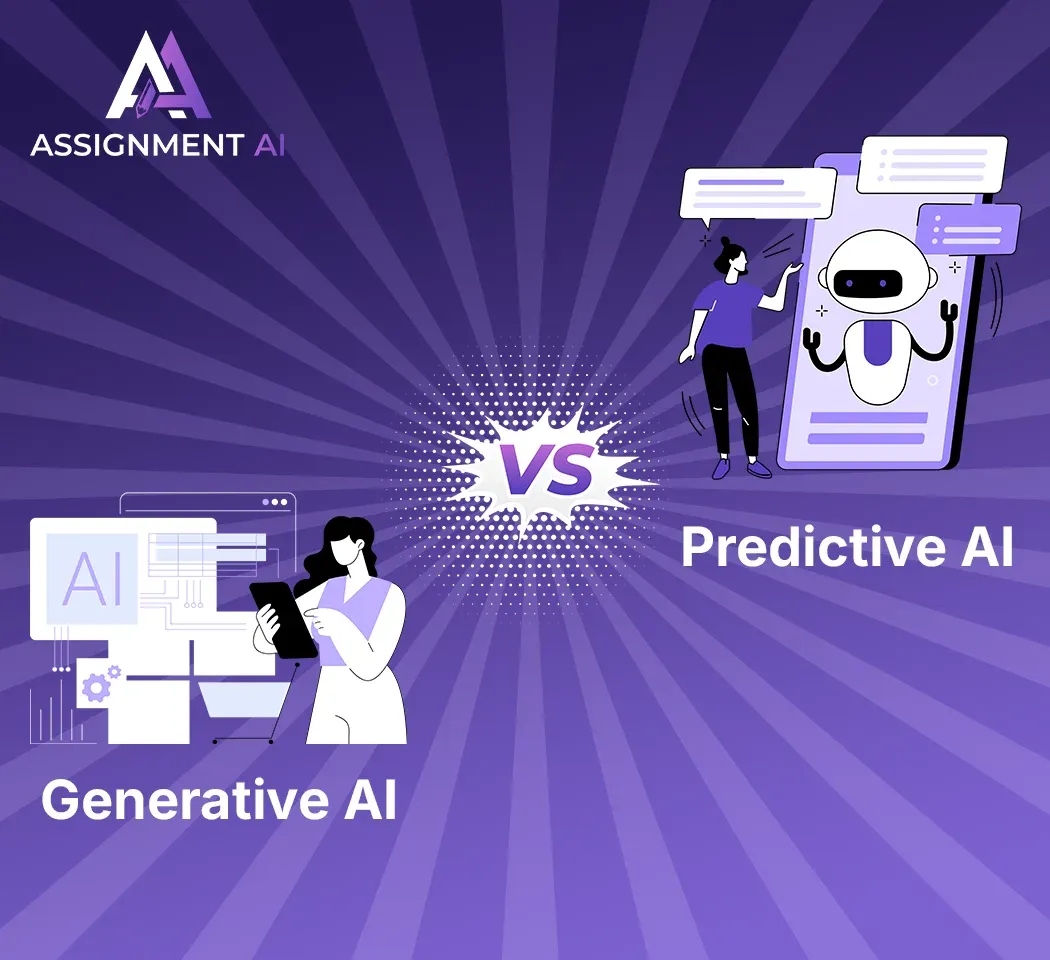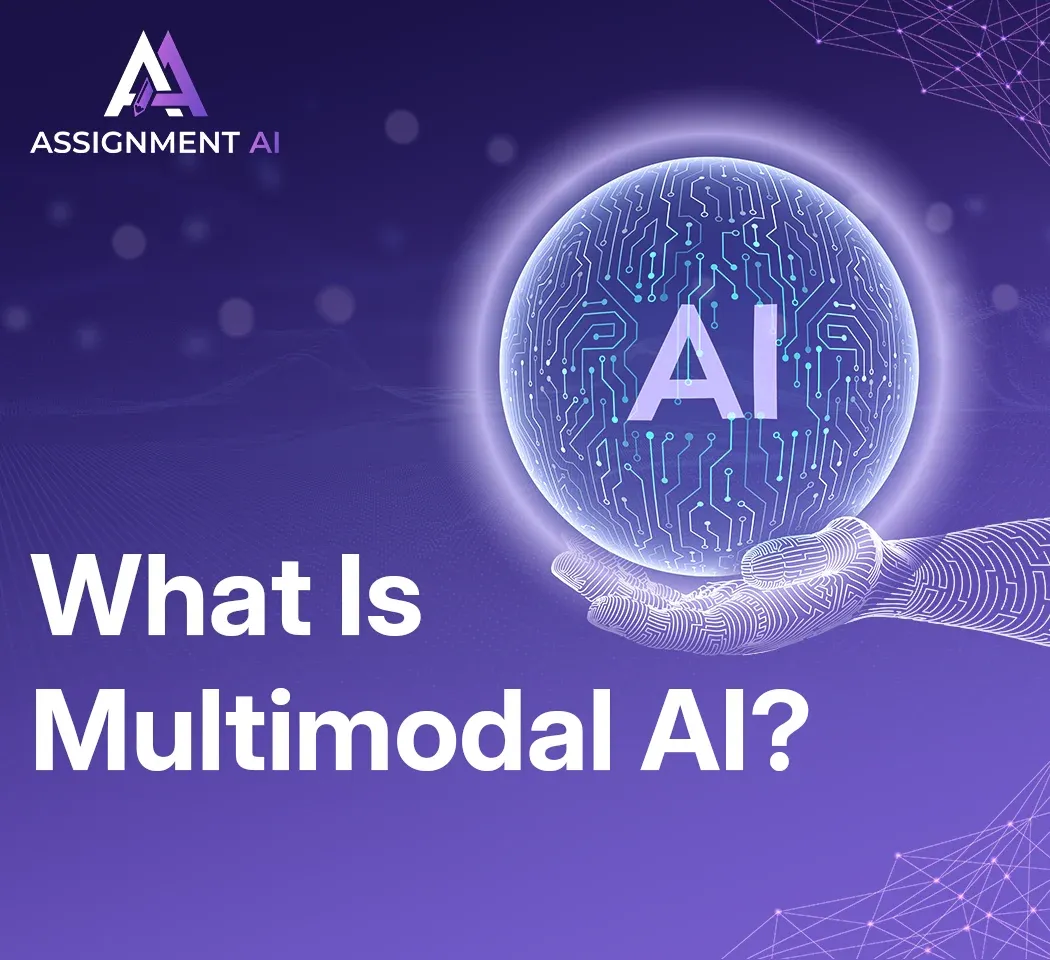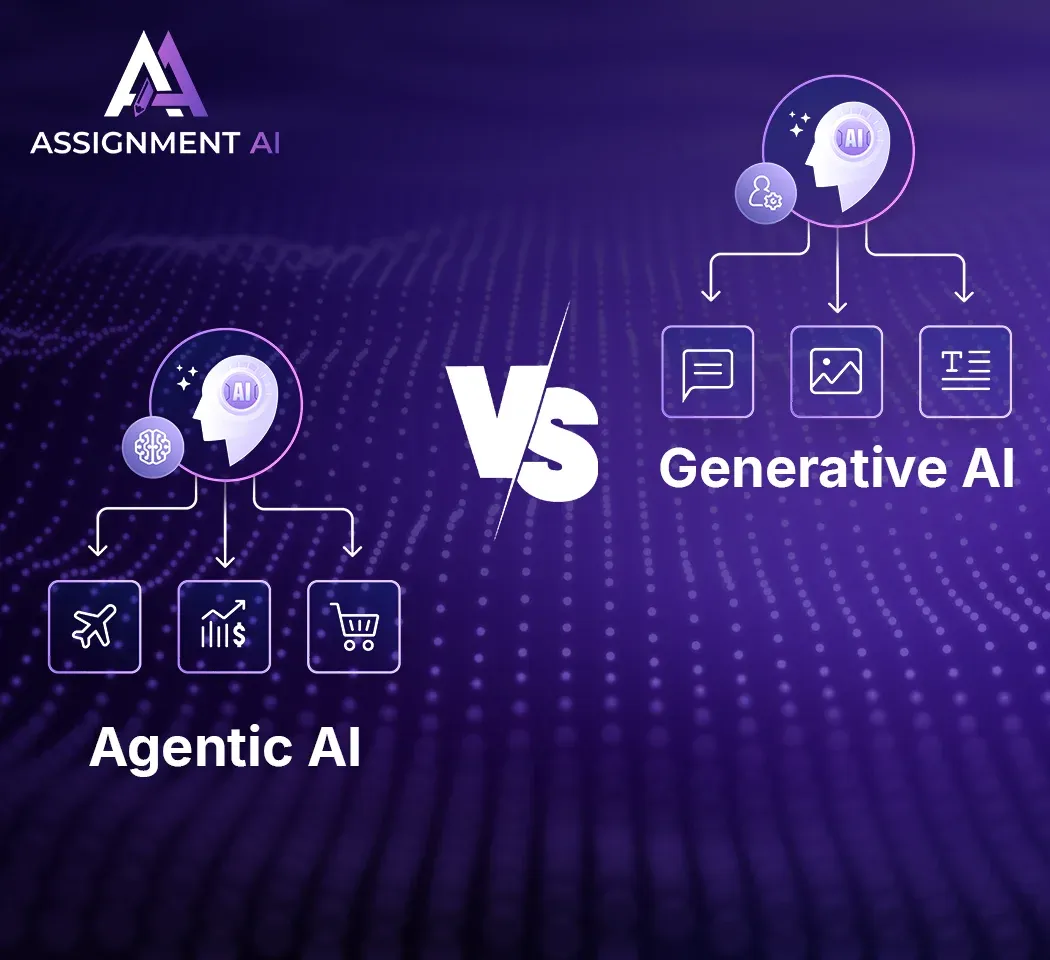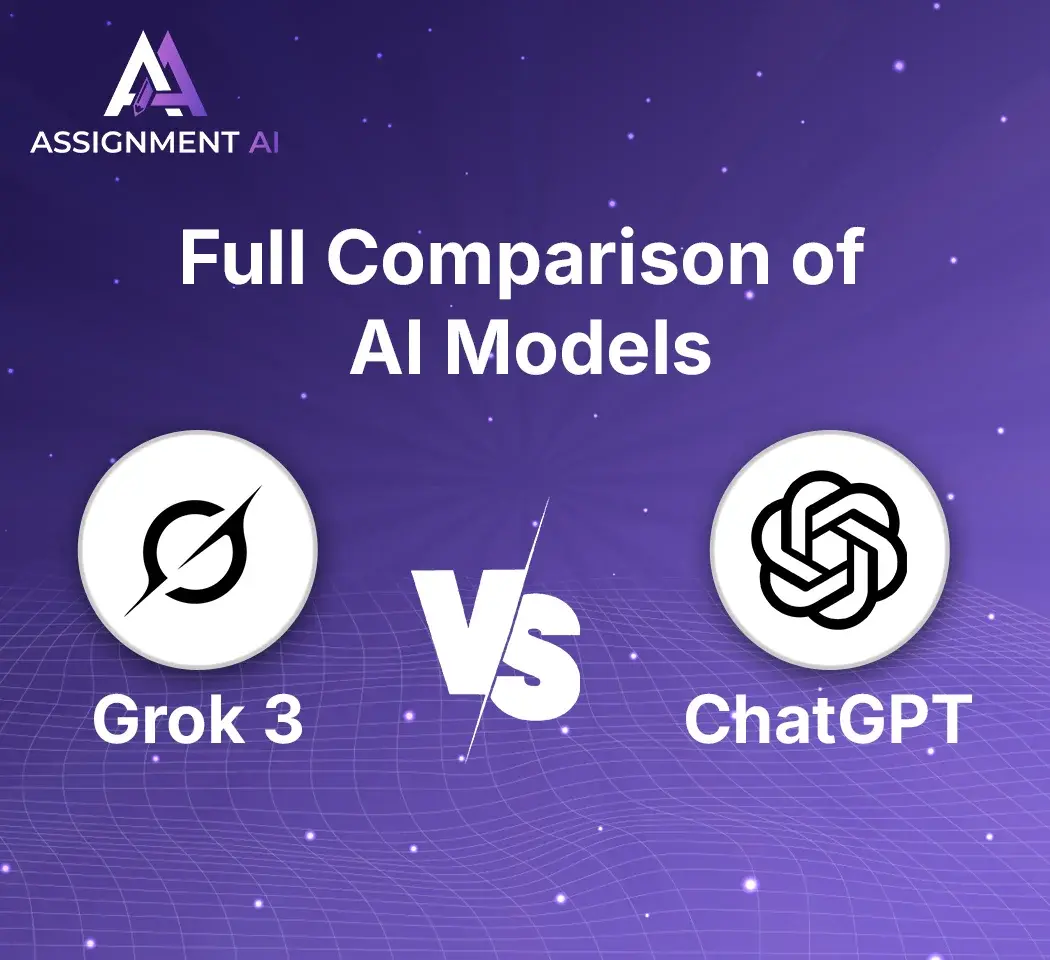AssignmentGPT Blogs
It does not matter if you are a doctor or a cleaning lady; you might have desired a tool that would take care of your repetitive tasks. For instance, if you are a content writer, you would probably want a machine to create content on demand.
A salesperson might require support in keeping an order of leads and follow-ups. Nevertheless, AI tools are making these desires come true today.
This article will explain AI Agents, how they function, and why their importance will increase in the year 2026. If you are wondering about the ways AI agents can facilitate your job and increase productivity, just continue reading.
Our Focus in this Article:
- What are AI Agents and how do they work?
- What are the benefits and limitations of AI agents?
- How are AI agents being used in different sectors?
- If you have to deploy AI agents for your business, what should you keep in mind before final deployment?
What are AI Agents?
If we understand AI Agents in simple language, then we can call it a kind of digital assistant that works for you. It observes that work itself, plans accordingly and then executes according to the planned path and can do all this work without human intervention.
The reason why today's AI Agents are so advanced is the technology used in them. As high-end technology like NLP, LLMs, and training models is used in advanced AI agents, this is why they are so advanced. And in 2026, dedicated AI Agents are available in every industry, which can handle even very complex operations on their own.
My Experience with AI agent: I noticed in a fruit shop in my local market that once they started using AI Agent for automating ticket handling, the ticketing process became much smoother due to which 56% time of the customers was saved and 7% customer rate increased as many customers used to go to some other shop due to long queues for getting tickets.
How Do AI Agents Work?
As much as AI agents sound futuristic, the working model of AI agents is also interesting. Let's find out how AI agents work and what the proofs and technologies they use.
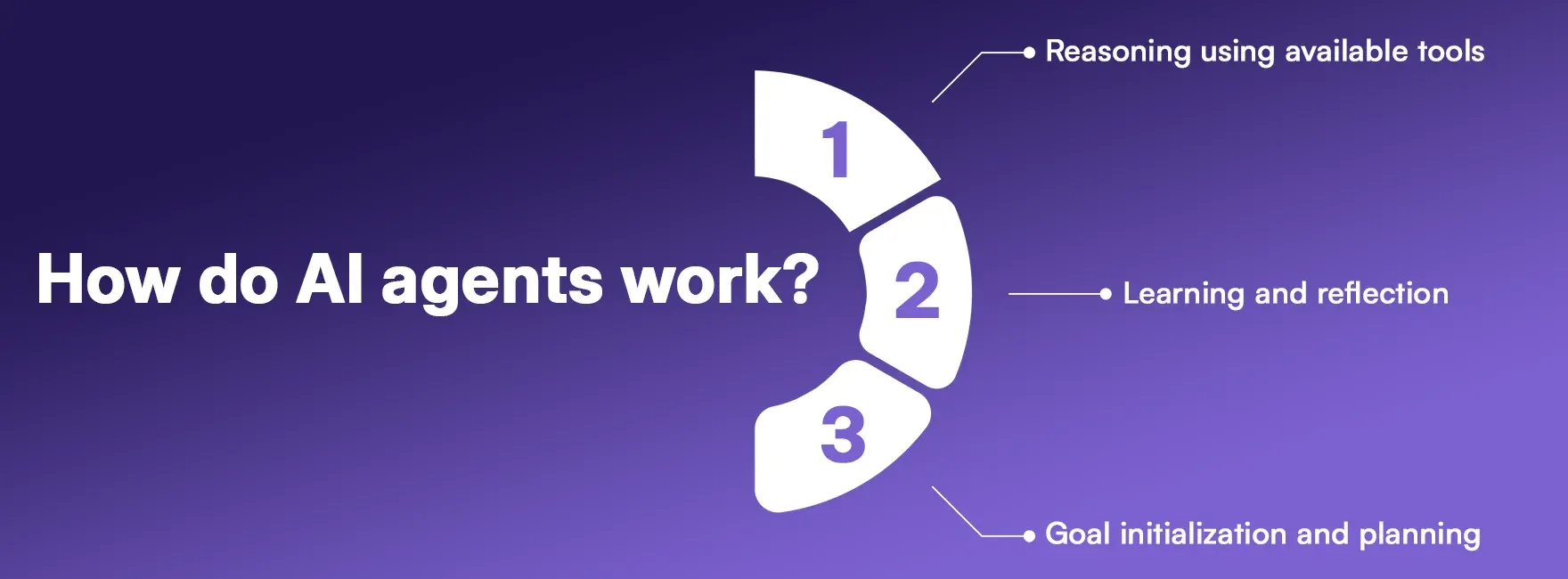
1. Reasoning using available tools
Most AI agents use LLMs' chain-of-thought reasoning to make decisions and call tools (web search, databases, APIs) just like you would get data from a researcher.
The working framework of modern AI agents uses an agent planning module, then an action module, and these AI agents are integrated with the company or business profile or CRM, which makes it quite easy for AI agents to observe and execute.
2. Learning and Reflection
AI agents analyze their logs, success metrics and errors, and refine their strategy through a feedback loop. This is why even if an AI agent has made a mistake in the past, it will now have the experience of how to fix it, and as the training of the AI agent advances, it starts becoming more perfect.
AI agents are developed in a way to prevent unsafe actions or avoid errors.
3. Goal Initialization and Planning
Businesses define their goals and design available tools to streamline business operations.
Then the agent creates subtasks and executes the plan, similar to the project decomposition process I learned and deployed in an AI-tool project, and after many days of testing, an AI agent is capable of handling business operations.
Key Features of an AI Agent
All AI agents have different features, and it depends on their industry and training on how accurate an AI agent will be, so that the company can get benefits from it. Let’s find out what features you can get if you prefer AI agents for your business.
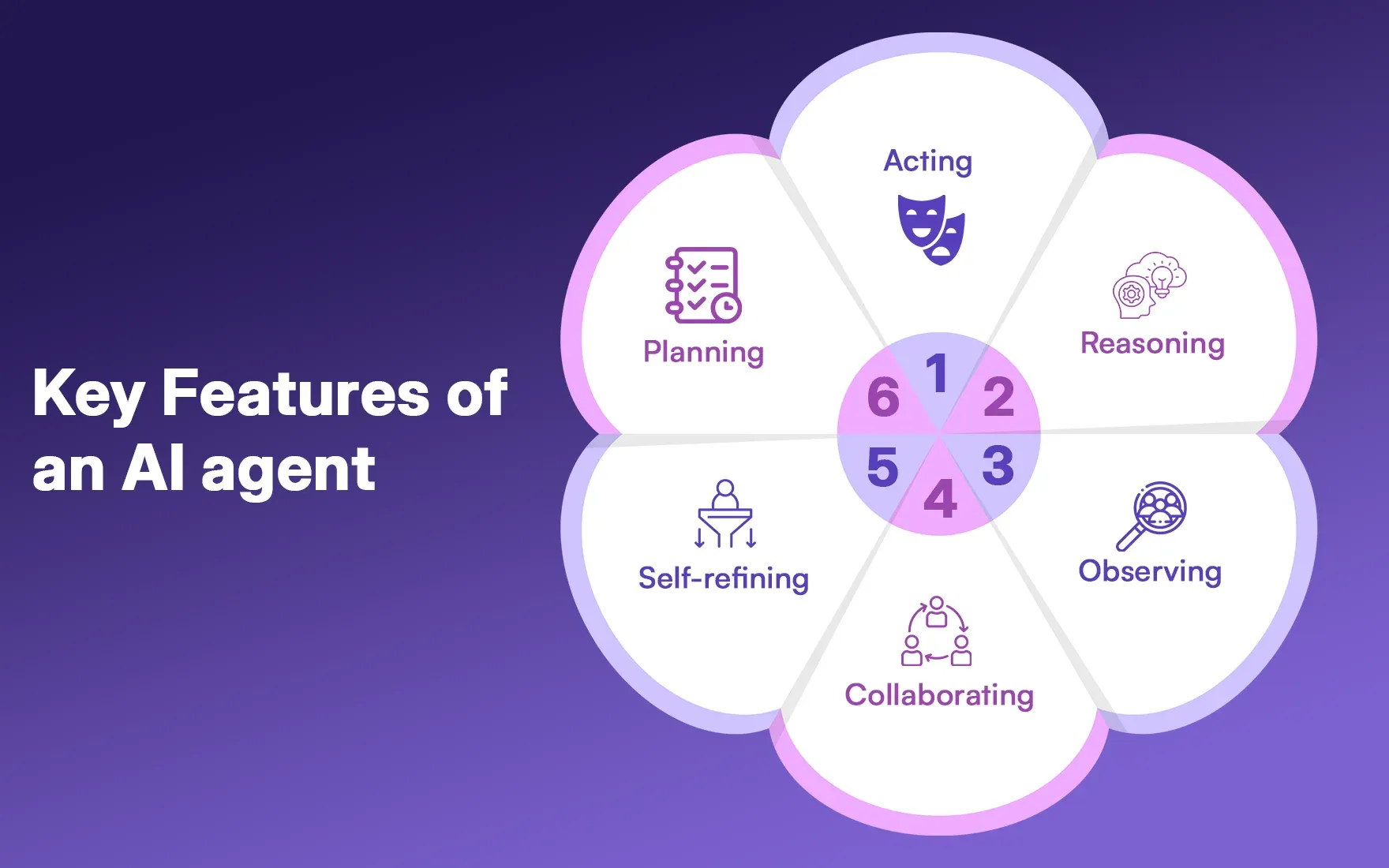
1. Acting: AI Agents automate tasks like email sending, ticket closing, and code execution via APIs. Whatever task AI agents execute, they save it in their system data so that they can provide detailed analytics to the business, so that the company can make future strategies accordingly.
2. Reasoning: Due to the use of LLM models, AI agents have intelligent decision-making capabilities, using which they can make decisions and execute according to the situation. LLM also enhances the agent's complex problem-solving skills.
3. Observing: The AI agent's memory and real-time metrics monitor his environment as it passes, which gives him an idea of what is being implemented in business operations, and then he uses that data to improve the efficiency of his tasks.
4. Collaborating: Multi-agent systems support a coordinated framework, which means that AI agents can work together with many tools and CRMs on a real-time basis.
5. Self‑refining: As we know, AI agents learn from their mistakes and continuously improve themselves by using the company’s previous logs, and as they have more training data, their accuracy also increases.
6. Planning: AI Agents adapt themselves according to the situation and update their memory according to the changes.
Types of AI Agents
Although there are many types of AI agents, currently, 5 AI agent types are the most popular in the industry. Let's try to explain them all in simple language.
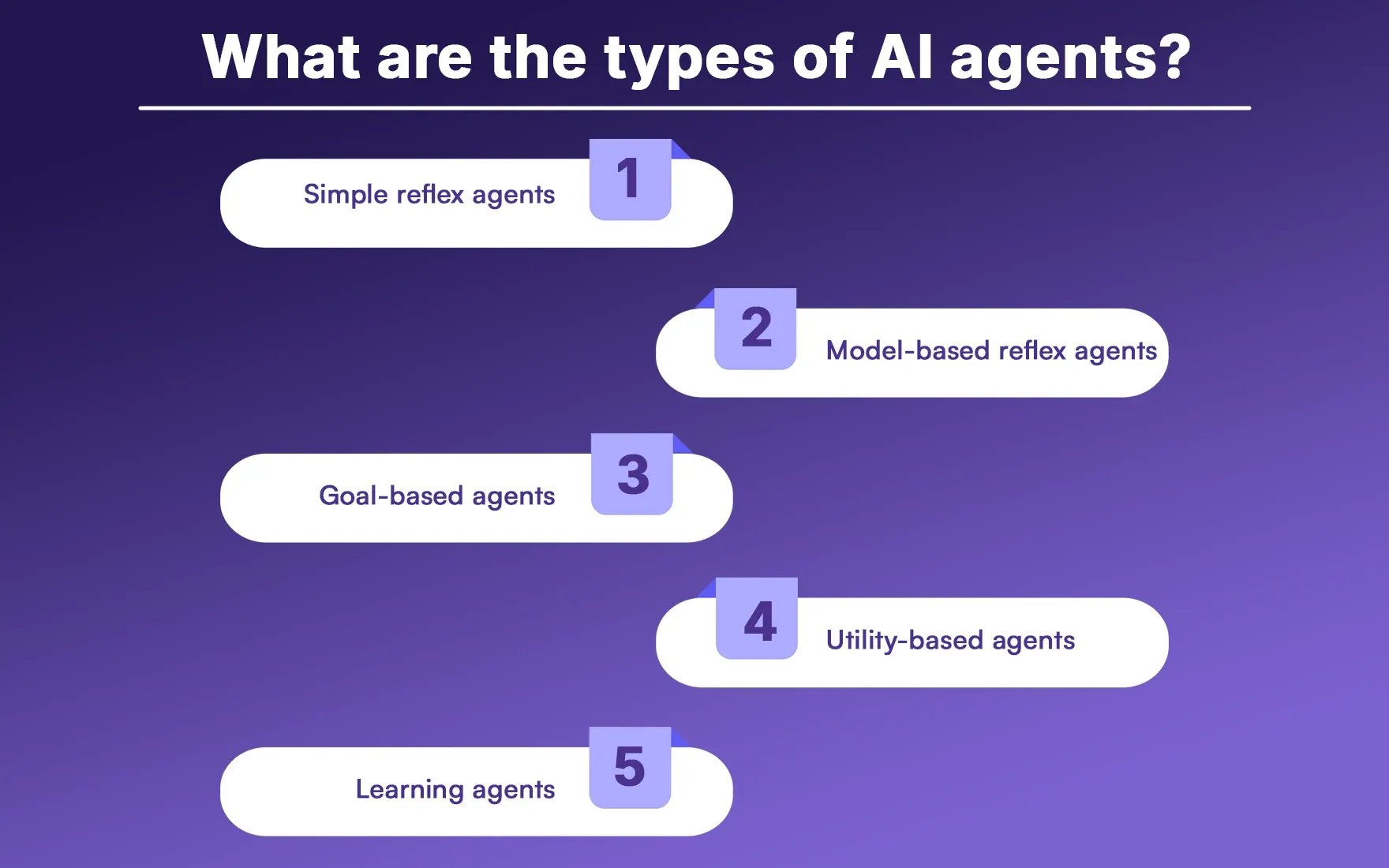
1. Simple reflex agents: This is an AI agent that is designed for fixed rules and will respond only according to fixed scripts. These AI agents are considered rigid.
2. Model‑based reflex agents: These are flexible AI agents that are trained on situational data and make their decisions according to the state of the situation. Model-based AI Agent executes using its learning reflex.
3. Goal‑based agents: These AI agents are trained using a goal-based strategy whose focus is to reach the goal. And if that AI agent is unable to achieve the goal in a fixed period, then the next time changes are made using the previous data.
4. Utility‑based agents: These AI agents try to choose the best option from the different available options. According to the situation, they use reasoning models to find the right option. Utility-based AI agents are quite different from goal-based AI agents.
Utility agents are used in sectors like Autonomous Vehicles, Financial Trading, and Energy Management.
5. Learning agents: Learning agents are used a lot in operations like chatbots, and they improve themselves with the feedback, and their accuracy gets enhanced over time.
I have spent a lot of time with learning agents, and I have observed that when the learning agent is trained using the correct data, its accuracy is quite good, which improves the ROI of the business and whereas if a template agent is used without testing, then a lot of errors are seen in the beginning.
Benefits of Using AI Agents
Whenever an AI agent automates or streamlines a business operation, businesses reap many benefits, so let's take a look at all the benefits.
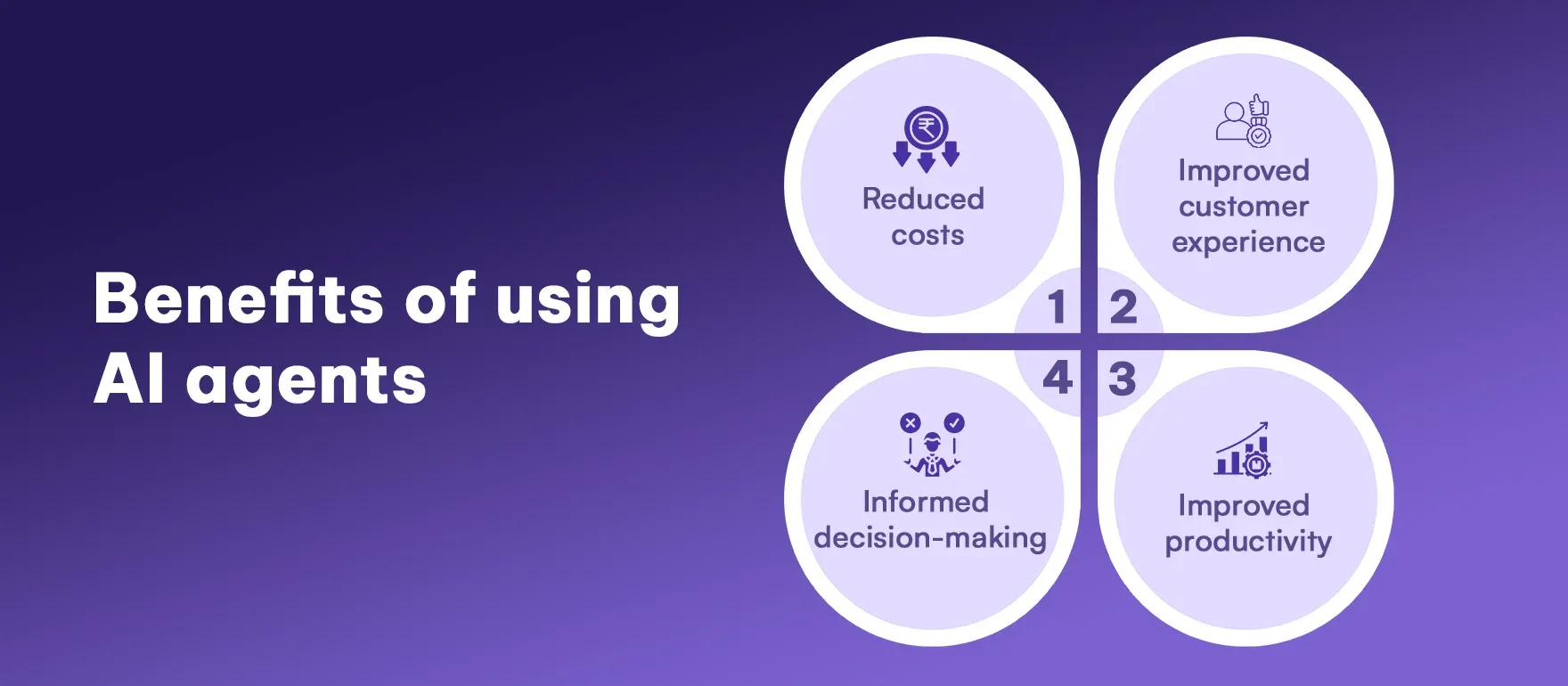
1. Reduced costs: When repetitive tasks are automated, reducing manpower and cycle costs, companies save a lot of time and operational costs. Advanced AI agents give good ROI for businesses.
2. Improved customer experience: AI agents provide proactive personalization and quick resolution, which boosts businesses' customer experience significantly. AI agent chatbot provides 24/7 customer support.
3. Improved productivity: When AI agents handle repetitive tasks on their own, human employees save time and can use it to focus on strategic work. Ai agents has increased manufacturing productivity by 20%.
4. Informed decision‑making: AI Agents synthesize data across systems to generate insights, so businesses have very detailed business operations reports that they can use to make future decisions and strategies.
Risks and Limitations of AI Agents
No technology is flawless, and there are many limitations in AI agents as well. Let's discuss it in detail.
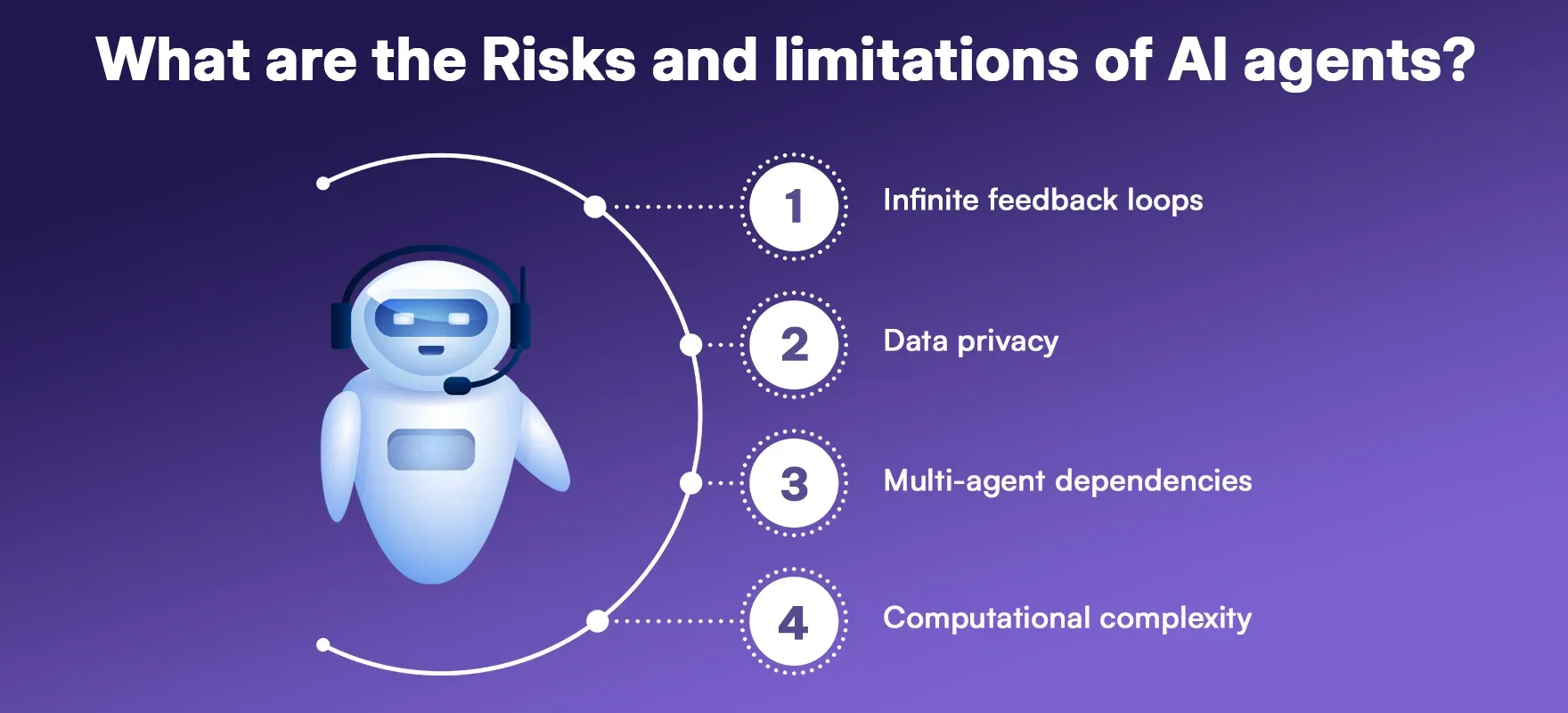
1. Infinite feedback loops: It has been seen many times that automation loops can be limitless without human checkpoints.
2. Data privacy: If AI agents are not advanced, businesses may face data privacy issues, in which businesses may have to face problems like company or customer data getting publicly leaked.
3. Multi-agent silos: If agents are deployed in siloed, poor integration reduces ROI, so always keep in mind while deploying AI agents that you should not prefer AI that cannot integrate with your other software.
4. Computational complexity: LLM usage, high compute demand and latency; hence, it is important to deploy an experienced and skilled team of AI agents, and it is also important that your staff is well trained to manage all the operations.
5. Ethical & legal concerns: If the training of AI agents is done with bias or inaccurate data, then this problem can also be seen in their execution. Hence, it is important to implement AI agents with accountability.
Use Cases of AI Agents
There are many uses of AI agents, as it is used by small businesses as well as large enterprises, and even many individuals use them for their tasks.
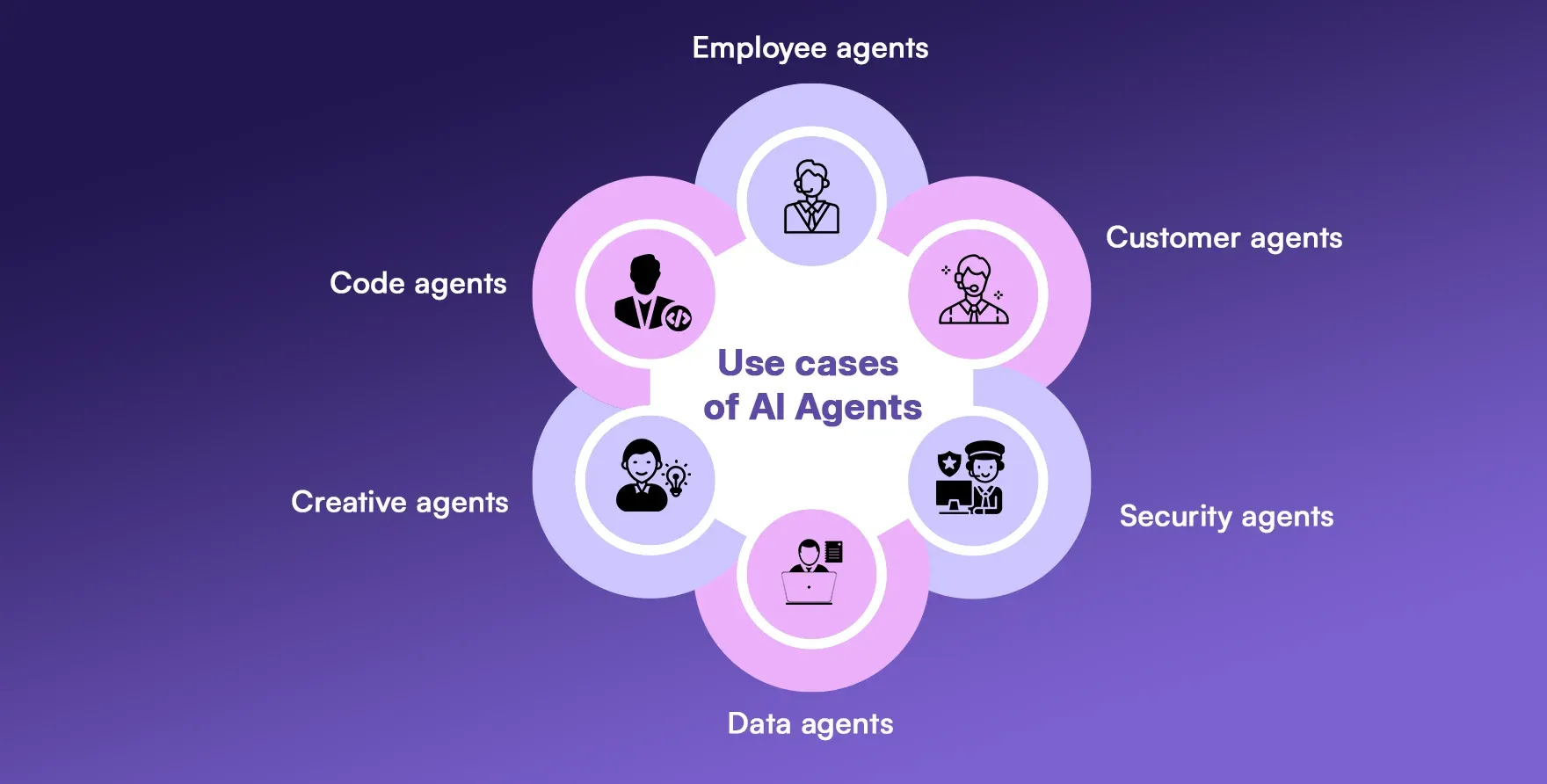
1. Employee agents: There are many dedicated employee agents available in the market for HR ticketing, finance workflows, expense reporting automation, and this is the major reason that from January to June 2025, a total of 77,999 employees have been fired from their jobs due to AI agents.
2. Customer agents: AI agents are also used a lot for services like booking, support, and sales via conversational UI and chatbots for customer support.
3. Security agents: AI agents are contributing a lot to the security sector, along with automation. Businesses use it for threat detection, compliance monitoring, and many AI agents automatically detect threats.
4. Data agents: AI agents are also used for large data analysis and predictions based on it, and it is used a lot for the stock market and trading.
5. Creative agents: Most of the AI agents in the market are used for creative tasks, which include content generation, social media scheduling or copywriting.
6. Code agents: There are many such AI agents available in the market which can generate codes, test it and even deploy codes. From this, you can consider it a kind of no-code platform.
My Experience: I used Hostinger’s Horizon software last week, which I found quite impressive as it created a functional web application for me in 5 minutes without any coding. From this, it is quite clear that code agents have become quite developed.
Best Practices for AI Agents
Now let me tell you from personal experience what best practices you should follow if you want to implement an AI Agent in your business.
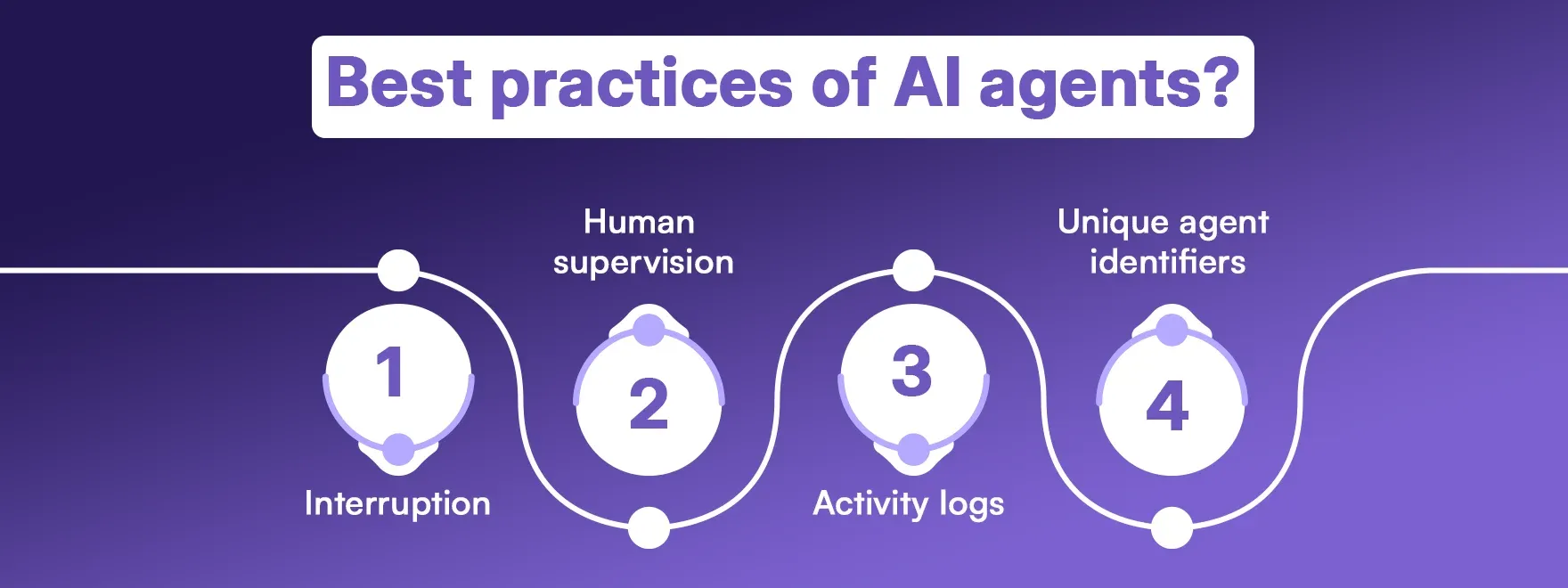
1. Interruption: Always give this option in the platform using which the user can pause or stop the AI assistant, because I have seen many times that if any issue comes in the AI Agent, then the UI of the platform gets spoiled, and hence it is very important to keep these options.
2. Human supervision: Never automate AI agents for critical tasks, and use AI agents only for repetitive tasks and include manual checkpoint approvals so that any issue can be fixed instantly.
3. Activity logs: Keep logs of your business operations saved in the system, as detailed logs are essential for audits and improvements.
4. Unique agent identifiers: If you use different AI agents in your business, try to have traceability IDs for each one. This will make it easier for your staff to manage the AI agents and will also help with legal issues.
Conclusion
If you want to give your business a competitive edge, you should try to use AI agents for repetitive tasks in your business. Initially, use it for simple operations, then deploy AI agents for your other operations based on ROI analysis and performance of previous AI agents.
Using AI agents mostly benefits businesses a lot, including time as well as cost savings.
My Recommendation: Whenever you deploy AI Agents in your system, train your staff accordingly so that they can increase productivity with the help of AI Agents, and always try to track the workflow of AI Agents through human staff so that any serious issues can be avoided.
FAQs
1. What is the difference between a Chatbot and an AI agent?
2. Can AI agents make mistakes?
3. Which industries are adopting AI agents?
4. What is the AI agent market's future like?
5. How do AI agents learn and improve over time?
6. How do AI agents use external tools, APIs, or databases?
7. How do AI agents handle memory and context?
Content writer at @AssignmentGPT
Ashu Singh, content writer at AssignmentGPT, crafting clear, engaging content that simplifies complex tech topics, with a focus on AI tools and digital platforms for empowered user experiences.
Master AI with
AssignmentGPT!
Get exclusive access to insider AI stories, tips and tricks. Sign up to the newsletter and be in the know!

Transform Your Studies with the Power of AssignmentGPT
Empower your academic pursuits with tools to enhance your learning speed and optimize your productivity, enabling you to excel in your studies with greater ease.
Start Your Free Trial ➤Start your success story with Assignment GPT! 🌟 Let's soar! 🚀
Step into the future of writing with our AI-powered platform. Start your free trial today and revolutionize your productivity, saving over 20 hours weekly.
Try For FREE ➤